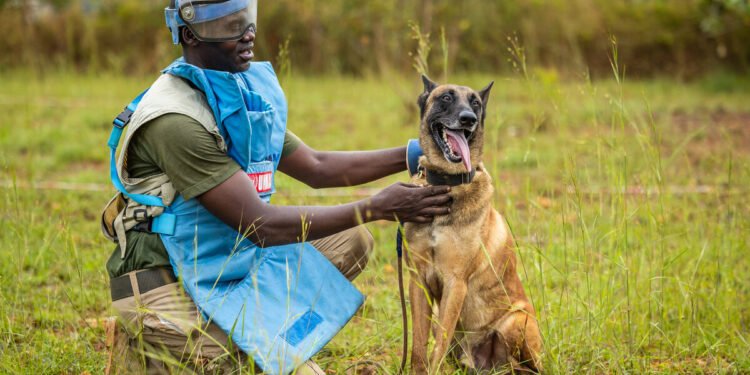
Wednesday 29 May marked the International Day of UN Peacekeepers, celebrating the 76 000 peacekeepers working towards bringing peace to conflict areas, and commemorating the 4 374 who died in the line of duty.
Seventy-six years ago, the world body sent military observers to the Middle East to supervise implementation of Arab/Israeli armistice agreements. The deployment was subsequently named the UN Truce Supervision Organisation, becoming the first of more than 70 peacekeeping missions under the blue UN flag.
Since 1948 more than two million peacekeepers from 125 countries have been detached to 71 operations worldwide.
Presently there are 11 UN missions in conflict zones across Africa, Asia, Europe and the Middle East with 76 000 men and women in service.
In his UN peacekeepers day message, Secretary-General António Guterres said: “Today we pay tribute to the more than 76 000 United Nations peacekeepers who embody humanity’s highest ideal: peace. Day in and day out, at great personal risk, these women and men bravely work in some of the most dangerous and unstable places on Earth to protect civilians, uphold human rights, support elections and strengthen institutions. More than 4 300 have paid the ultimate price while serving under the UN flag. We will never forget them.”
The theme for this year’s commemoration id “fit for the future, building better together”. It embraces the contributions made by UN peacekeeping as part of finding solutions for more than 75 years and incorporates Guterres’ new agenda for peace policy brief. The document outlines a path for multilateral peace and security operations to remain viable tools to address future crises and conflict.
“UN Peacekeeping remains a unique global partnership, with peacekeepers from over 120 countries making a meaningful difference every day to millions of people in some of the most world’s most difficult places,” said Jean-Pierre Lacroix, Under-Secretary-General for Peace Operations. “As we respond to tomorrow’s challenges, UN Peacekeeping continues to evolve, leveraging partnerships to be nimble, responsive and fit-for-purpose, promote stability, protect the vulnerable and help to build a durable peace.”
South Africa is a relative newcomer to international peacekeeping with contributions confined to Africa, for both UN and African Union (AU) missions. It is the 14th largest uniformed troop contributing country (TCC) to UN peacekeeping with South Africans donning the blue helmet in Abyei, Democratic Republic of Congo (DRC) and South Sudan, according to a UN statement.
Although 29 May is International Day of UN Peacekeepers, the UN is today, 30 May, holding commemoration events at its Headquarters in New York. Guterres will lay a wreath to honour all UN peacekeepers who died since 1948. He will also preside over a ceremony in the Trusteeship Council Chamber at which Dag Hammarskjöld Medals will be awarded posthumously to 64 military, police, and civilian peacekeepers who lost their lives serving under the UN flag, including 61 who perished last year.
SA Air Force (SAAF) helicopter navigator Sergeant Vusimusi Mabena, killed while on duty with MONUSCO in February last year, is among the dead who will be honoured.
Guterres will also present the 2023 Military Gender Advocate of the Year Award to Indian Army officer Major Radhika Sen, who served with MONUSCO.
Created in 2016, the award “recognises the dedication and effort of an individual peacekeeper in promoting the principles of UN Security Council resolution 1325 (2000) on women, peace and security”.
Unrelated to the International Day of UN Peacekeepers, the South African National Defence Force (SANDF) last week handed over tombstones to the families of the late Rifleman Karabo Edwin Matsheka and Rifleman Lesego Maxwell Hertzog Lebatlang, who were killed during the Battle of Bangui in 2013.

“With poverty remaining stubbornly high in the area, it was increasingly difficult for the families to erect tombstones for the departed warriors, and the commander of the South African Infantry Formation, Major General HD Mashego took a conscious decision to raise funds to give the project of erecting tombstones for the fallen warriors a leg up,” reported Magauta Mokononyane for the SANDF.
Paratrooper Veterans under the leadership of Honorary Colonel, Colonel R Kramer, contributed towards the initiative, which saw the headstones handed over on 23 and 24 May in Montsio, in the Northern Cape, and Maketleng, in the North West.









